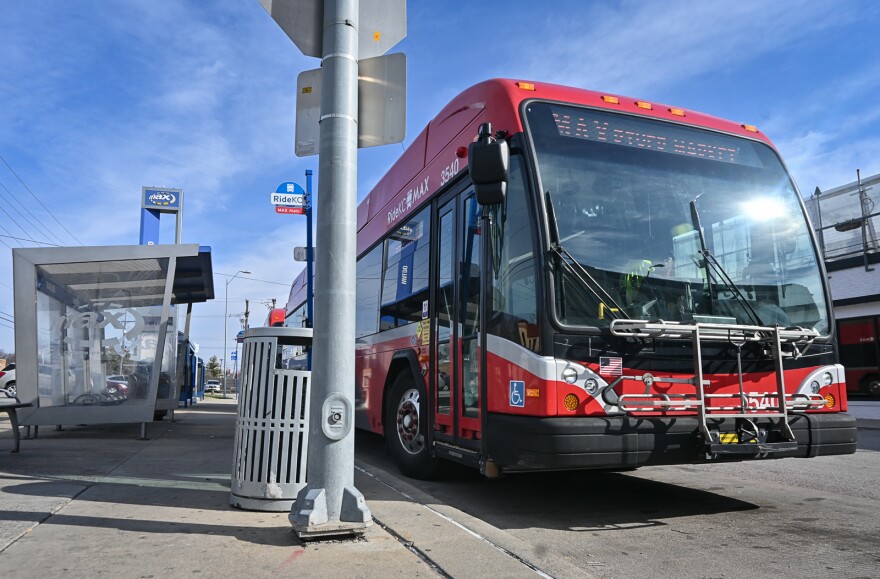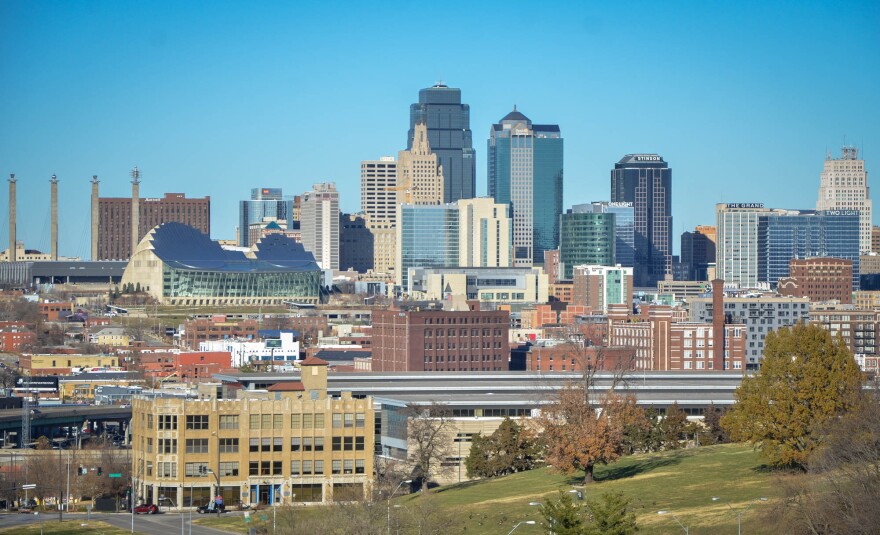Kansas City is planning to spend a lot of money in the upcoming fiscal year — $2.3 billion, to be exact.
The Kansas City Council approved its annual budget on March 28, which officials say is the largest in the city’s history.
Why should you care about a budget? For one, the document is a reflection of the city’s priorities.
Budgets help reveal the city’s current financial standing and outline how the city will spend its money – most of which comes from taxpayers. The budget shows the amount each city department receives and how that department plans to spend that money.
The 2024-2025 budget, which takes effect in May, will fund pay raises for police officers, street fixes, infrastructure improvements, housing programs and new trash carts.
Here are seven major takeaways from Kansas City’s new budget:
1. Kansas City has more money to play around with…
Kansas City Council says that city revenue has grown by 10% to $2.2 billion, primarily due to increases in revenue collected from taxes.
Earnings taxes and sales taxes are Kansas City’s two largest sources of revenue, each making up about 22% of the city’s funds. Property taxes are number three, accounting for 14%.
Newer taxes are also adding to the city’s coffers, though not at the same level.
Kansas City implemented a recreational marijuana tax in 2023, for example, after Missouri voters legalized it statewide. The 2024-2025 fiscal year budget will reflect the first full year that tax has been in place.
The budget estimates Kansas City will collect $3 million from marijuana tax revenue. Those proceeds are split three ways between trash pickup, initiatives to end homelessness and violence prevention.
Kansas City also collects taxes from people who stay in hotels and Airbnbs. Money from the hotel/motel tax took a huge dip during the pandemic, but has since bounced back.
This next year’s budget estimates $35.2 million in hotel and motel tax revenue, up 21% from the year before.
2. …but it’s also spending more money than ever.
At the same time the city’s revenues have gone up, so has its spending. In fact, Kansas City is spending more money than it’s taking in: While revenues increased by 10% in the 2023-2024 fiscal year, expenditures grew by 13%.
To cover that extra spending, Kansas City is taking additional money from its general fund balance.
It’s like if you don’t have enough money in your checking account to buy a big ticket item — such as a new car — so you withdraw money from your savings account.

As a result, city finance director Tammy Queen said that Kansas City is sitting on a “structural imbalance,” which could worsen in the future if council funds projects like the South Loop Link park above I-670 and a potential Royals stadium downtown.
“Every time we add a new program, and we don't have a new source of revenue, we are worsening our structural imbalance,” Queen told council members in February, when the budget was first introduced.
To fund the 2024-2025 fiscal year budget, Kansas City is taking $38 million from its general fund.
Queen said if the city continues spending like that, it will deplete the general fund – which took years to build up.
“We just remain concerned about keeping it at that level, and ideally not coming back to you next year and saying all those cute programs that got added, they have to be cut,” Queen told council members. “Or something has to be cut in order to balance our budget for the future.”
3. Police funding grows even higher
Last year was the city’s deadliest in history, with a record 185 homicides, spurring officials to look for ways to reduce violent crime.
This budget gives the Kansas City Police Department the most money out of any city department: $320.8 million.

That’s an increase of about $36 million from last year. Mayor Quinton Lucas said the increase will support pay raises for officers and hiring 150 more police officers.
Missouri law requires Kansas City to allocate at least 25% of its budget every year to the KCPD. But city council doesn’t control that money – it’s instead managed by the Kansas City Board of Police Commissioners, which is made up of Mayor Quinton Lucas and four other members who are appointed by the Missouri governor.
4. Violence prevention efforts outside police get more support
Some residents and activist groups remain critical of Kansas City’s plan to add more police officers. Among them is Charles DeLeon, who attended Lucas’ state of the city address in February.
“I think in his goal and his quest to reduce homicides, we need to prioritize these social services, not only for children, but also for adults,” he said.
To that end, Kansas City is also dedicating money to programs outside of the police department that are aimed at reducing gun violence and crime.
The city will give $7 million to the health department for things like Aim4Peace, a group that takes a public health approach to reducing gun violence. Aim4Peace has first responders trained in conflict resolution to intervene in violent situations, and who visit gunshot victims in hospitals to prevent retaliatory violence.
The health department also supports Partners for Peace, which offers social services to victims of violent crime, families of homicide victims and people who may be likely to commit crime.
Kansas City set aside $1.3 million for a new program called REACH, which is meant to divert certain emergency calls – such as those involving mental health or homelessness – to the health department rather than police.
The goal of REACH is to reduce the number of people who interact with the police and end up incarcerated.
LaTonia Draffen is a leader with Decarcerate KC, a group focused on prisons and policing, which pushed for the REACH funding. She said it would have helped her son and grandson, who are currently incarcerated.
“This program will help people get their needs met without the police, jails, or force having to get involved,” Drafften said. “This is transformational for people like me, like my son and like my grandson.”
5. Buses remain free, for now

The future of buses in Kansas City has been a major uncertainty for the last few months. But funding to the Kansas City Area Transportation Authority should maintain current service levels and zero-fare for one more year.
The KCATA eliminated bus fares in 2020, using COVID relief funds to pay most of the way. But Kansas City also helped subsidize with its own budget – $3 million in 2021 and $4.8 million in 2022.
But the KCATA officials told City Council members last month that it’s facing a $26 million budget shortfall at the end of 2024, when those federal funds run out. Officials warned they may have to cut service if they cannot make up the losses.
Kansas City’s budget this year allocates $70.8 million in total to the KCATA, with money coming from the city’s public mass transit tax and KCATA sales tax. That’s an increase of $15 million from last year’s allocation.
Climate advocacy group Sunrise Movement KC said that’s still not enough, and criticized city council for failing to “fully fund” public transit.
“From the way we see it, there has been no steps taken to actually improve and expand bus service, it really is kind of a matter of sitting on their hands,” said Sunrise Movement KC member Raymond Forstater.
Even charging bus fare again would not be enough to cover the deficit. A study found it would only net between $5.8 and $7.1 million per year.
If the KCATA ends up reducing or cutting service, Forstater says that will hurt poor and working-class residents the hardest – as would charging for fares.
“That has real impact on how people are able to live out and schedule their lives,” he said. “Reduced frequency makes it harder for people to access jobs.”
One problem is that Kansas City is the largest local contributor to the KCATA — but the agency cannot keep relying just on those two public transit sales taxes for funding.
“Kansas City can’t forever subsidize transit for communities not electing to fund it for themselves,” Lucas said in July 2023.
KCATA and city officials have suggested that other municipalities in the Kansas City metro, which benefit from bus service, should contribute more money to the agency.
“We have to do more if we want a quality transit system that is effective and reliable,” said Council member Eric Bunch last month. “We've gotta raise more money.”
6. Streets, sidewalks and trash carts, oh my!
You may have noticed smoother streets, and hopefully fewer potholes, driving around Kansas City. That’s because the city has allocated more money to street resurfacing in recent years.
For the 2024-2025 fiscal year, the city set aside $40 million to resurface 400 miles of road. (The city resurfaced about 500 miles in the previous period). Another $12.5 million will go toward sidewalk improvements.

Vision Zero, the city’s plan to eliminate traffic deaths by 2030, will receive $4 million to make city streets safer by changing the configuration of roadways. This can look like a road diet, which reduces the number of lanes in favor of bikes, medians and wider sidewalks.
Despite the city’s efforts, traffic fatalities are among the worst in the country – defying national trends of roads getting safer.
In 2023, 102 people died in traffic crashes, according to the KCPD. And there have already been 24 traffic deaths so far this year, outpacing last year’s total of 13 in the same time period.
Kansas City is also allocating $8 million for new trash carts, litter cleanup and expanding the city’s bulky item pickup program. The trash carts will follow the new recycling carts that residents got last year.
7. Also, City Manager Brian Platt is sticking around
The same day that Kansas City Council passed its budget, it also renewed the contract for City Manager Brian Platt until 2027.
Platt was originally appointed by City Council in 2020, and he was already Kansas City’s highest paid employee. Under his new contract, he’ll get a 15% raise, to $308,000 a year.
City Council decided to renegotiate Platt’s contract last month after he was named a finalist for the city manager position in Austin, Texas. Platt then withdrew his name from the job search days later.
Council member Melissa Robinson was the only no vote on Platt’s contract extension. She criticized the limited time given to review the documents, and Platt’s lack of an employee evaluation.
“The folks who elected us to do this job expect us to represent our interests,” Robinson said afterwards. “I think discussion is one way that you do that and not to rubber stamp a contract that we had, you know, only hours to review.”
What else do you want to know about Kansas City’s budget or city programs? Text your questions to KCUR at 816-601-4777, and we’ll try to answer your questions in future reporting.
Find out more about KCUR’s text program here.






